Hi-Chews to High Peaks: SPA 204 through a new lens
It started with Hi-Chews and an unexpected invitation to “sit at the table.”
From my first days with SPO, a few stood out acting as warm enveloping blankets for several years to follow. When Paloma entered 359 East Pyne during the fall semester of 2024, as she often did just to say “hello”, I had no idea it would actually be an invitation that would metaphorically and literally send me on a zipline across language barriers and mountainous ravines.
Ecuador, the Andes, and the Medical Caravans
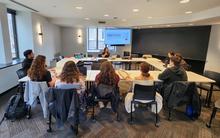
Since the day I learned of SPA204 medical caravan during the spring of 2022, I was fascinated by the course and elated for those who were lucky enough to be chosen to participate. As I assisted with logistics for the groups, I often pondered the idea of being able to join in service to the Andean communities and how I could return the feel of that warm enveloping blanket to others in this world.
Three years later it was decided, in what seemed like an instant, that I would be joining the group in Ecuador during spring break of 2025. The weeks that followed didn’t seem real as I attended Paloma’s classes in Wooten Hall to help in getting to know the group and prepare for the trip. I sat quietly in the back of the room on my first visit, fittingly on Valentine’s Day, and was immediately transported back to my own classroom experiences, both as a student and during the many years I spent teaching Spanish in the early days of my career.
The sweet treat that Paloma brought for the students would serve as a tasty representation of my experience with SPA204 students in class and subsequently in Ecuador. Both were pleasant surprises for my senses. With their own special individual packaging, they were tricky to open but once revealed each specimen was unique and inviting and left a lasting impression. Needless to say, Hi-Chews, and by association SPA204, were my new favorites!
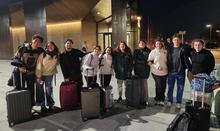
As we discussed the trip in several classes, it became clear that we were in for something challenging, exciting and unlike anything we had ever experienced before. But this clarity didn’t do much for preparing in practice because the reality hit as we gathered in front of the Wawa at Princeton Station at dusk armed with bags, snacks and restless anticipation. In the blink of an eye (because there was no sleep to be had on the flight) we landed in Quito and would pushing through the jet lag as our entertaining and way too energetic tour guide tried to convince us we weren’t tired. We finally landed under the Virgen de El Panecillo who was gracefully watching us in disbelief as we stood there in awe for that iconic shot complete with a with lifted arms in salutation to this enchanting city from high above. Earlier that day, as our plane descended, the view offered us a stunning preview of the city’s landscape with its lush, dark green mountains crowned with rich brown soil, a striking contrast to New Jersey’s post-winter blandness. The vibrant culture and luscious terrain of this land, so different from what we knew, would soon become part of our daily lives, and we couldn’t have been more excited.
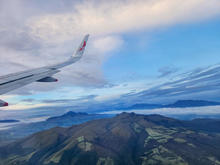
Despite my amateur photographer status, telling this story through the eyes of our students and the lens of SPO’s brand new Nikon ZII became my mission and, somewhere along the way, tracking down the best gluten-free treats for Lana, SPO major and graduating senior, became a quiet second. It started with pastries from a niche bakery in my hometown, and came full circle when I surprised them with a gluten-free treat from a famous bakery in Baños, Ecuador at the end of our trip. It seemed fitting that Lana was the one to graciously invite me to the table at Wooten Hall, after my various attempts at staying inconspicuous, especially in a setting where food so often became a gesture of care and connection. This would set the tone for the rest of the trip for me and would become the spark for this piece.
Since the students were tasked with documenting their experiences, an Instagram “takeover” felt like a natural fit. Equipped with their own phones and paired with a classmate, they captured moments that would be shared on SPO’s Instagram feed, offering a chronological glimpse into their journey. However, the focus of my own lens isn’t on the timeline itself, but on the moments that truly stood out while watching these young minds absorb their surroundings through the lens of language, culture and nature, all shaped by their unique personalities.
With Cotopaxi (one of Ecuador's many volcanos) looking over its people from a distance the group arrived at its first caravan along with the hosting clinic (FIBUSPAM), it’s medical staff and local nursing students. Although each student and staff member arrived with slightly different levels of preparation, this particular caravan presented a unique challenge and one that offered both inspiration and room for growth. With clear skies, positive attitudes, and plenty of UV protection (though I somehow forgot mine, ugh), the group welcomed its first visitors to the pop-up clinic.
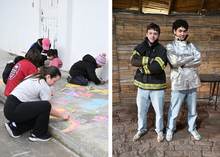
A few helpful phrases from our ever-enthusiastic tour guide, Abraham, helped with the initial introductions in Quichua, but before long, the students had to rely on gestures and illustrations to help visitors understand what was being offered at the clinic. For Uriel, this experience sparked a deeper desire to learn Quichua. Her enthusiasm was unmistakable as she engaged in animated exchanges, all in an effort to connect with our visitors and help them make the most of the medical caravan. Along with me, Uriel later became the unofficial photographer of this and the next several pop-up clinics on this trip. Armed with an instant Polaroid camera, she captured snapshots, shared smiles and generally created a lighter atmosphere. In one of the caravans, what could have been a stressful visit to the gynecologist for the women that came, turned into an unexpected moment of female bonding and cross-cultural exchanges in what was initially a stark and crowded waiting room.
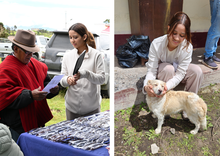
In the courtyard, under a makeshift canopy, Alanys with the help of Abraham (our self-professed Quichuan “translator”) and some illustrated literature, was able get her point across and make a real difference by offering the gift of clear vision to people who may have been silently suffering for decades. Reading glasses were lined up like sparkling gems along with hand-held mirrors to help our elderly Andean visitors envision a brighter future. Alanys would later take on the role of dog whisperer, determined to feed the overwhelming canine population one puppy at a time, even if it meant sacrificing her fashionable wardrobe in the process.
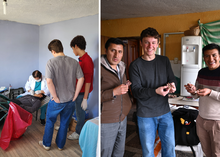
Meanwhile in a small room equipped with a summer lounge chair (more suited for sunny retreats than dental work) our resident dentist used it as an unlikely tool to ease the suffering created by tooth decay and other untreated oral maladies. The work was done swiftly and smoothly thanks to Eli and Willem who stood by to assist in easing the stress for visitors while helping our specialist get the job done. Choosing dentistry as his area of service seemed fitting for Eli’s bold nature as he would later prove by graciously accepting the honor extended by the families of our host clinic, who had prepared a meal that included cuy (guinea pig --a local delicacy) as a heartfelt gesture of gratitude to the caravan volunteers. Some locals and a few of us from the group watched with a mix of admiration and amusement as he took his first hesitant bite in the makeshift kitchen. Something tells me there will be more dentistry (as he hinted on the bus) as well as culinary adventures in Eli’s future.
Reema, one of our resident seniors, would emerge as the ‘mother’ of the group often being the silent contributor and supportive pillar for others. Her love for animals shone through in her research, and you could palpably feel her passion when she spoke about her work with the local deer in the Princeton area. Her quiet demeanor harmonized with the majestic landscape we encountered upon landing in Quito and I am certain the empathetic nature we witnessed during this trip will serve her well in her chosen career path.
Adding to the group's empathetic spirit and natural tendency toward caregiving, Willem stepped into the role of the playful ‘father’ and took moments from his assigned station to patiently guide the children of the caravan’s visitors with a gentle hand and a sweet smile. Whether inside the clinics or out on the surrounding grounds, armed with colorful pencils, paper, chalk, and whatever else he could get his hands on, he kept the kids engaged in lively play.
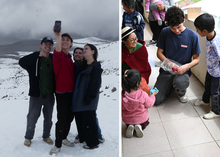
Willem would later show us the extent of his playful nature as he charged ahead with childlike enthusiasm up to 15,000 feet with some of his more adventurous classmates on a late day visit to Chimborazo, the majestic peak that rivals Mt. Everest by being the “farthest point from the center of the earth”. As the rest of us continuously measured our oxygen levels trying to catch our breath, Willem’s group was off taking once-in-a-lifetime photos at the highest point of the path. As the sun dipped, the temperature dropped, and snow began to fall, we grew concerned but it was short-lived as they finally returned cold, smiling, and exhilarated from the spontaneous adventure.
If Willem and Reema embodied the parental roles within the group, Hilal naturally stepped into the role of the eldest sister. Her prior experience at the clinic proved invaluable, helping guide her classmates through unfamiliar terrain both literally and figuratively. From the start of the semester, she became a key reference point for Paloma, offering insight and support as they prepared for the trip. She also had a playful side that often led to joyous exchanges with her more spirited classmates, frequently ending in fits of laughter and culminating in a sweet moment on the plane ride home.
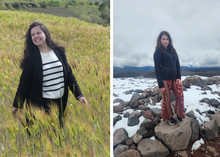
Meanwhile, Emily, keeping true to her own vivacious personality, was perched at a landing along with a few of us and, unfazed by her low readings on the pulse oximeter, was taking full advantage of those breathtaking instagrammable views that would help to document her own experience at Chimborazo. While she worked in service to help the Andean communities during the caravans at the various stations, Emily’s lighthearted spirit brought joy to the group, always finding just the right moments to make everyone laugh out loud including the occasional well-timed selfie reflection in a mirror (with me, of course!) and an .
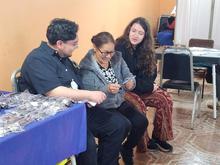
And then there was Noel. The one quiet soul who eloquently shared his compassion not only with the Andean community during the caravans in his various chosen stations, but also with his classmates. During the lulls and quiet moments at the ophthalmology station that he shared with Emily, his compassion was evident when he took on the role of assistant professor helping her navigate the more difficult aspects of the Spanish language. His native fluency, coupled with his calm demeanor, helped ease the pressures of an immersive environment and one that demanded both linguistic agility and heartfelt service. And through it all, Noel hiked the rugged Andean trails in his signature cowboy boots, a quiet testament to his unique blend of grit, grace, and individuality.

Jazmin brought a calm and professional presence to the medical caravans, handling patient interactions with efficiency and care. Her thoughtful engagement stood out quietly throughout the week, and her final gesture in drawing the Princeton shield in chalk while playing with the children at the last caravan was a sweet and memorable way to end the trip.
Along with these, one other memorable moment stood out where Willem and Eli literally put their hands (and faces) to the fire, looking like a 1960s pop star meets the village people during preparations for an unforgettable experience with a traditional indigenous meal, or pachamanca, prepared with scorching hot rocks in a dug-out pit in the ground. A once in a lifetime event for all of us!
In conclusion, this trip was more than just a chance to sharpen my photography skills. It was an opportunity to reconnect with young, developing minds and to experience the journey not only through the lens of a new camera, but also through the process of discovering what makes each traveler unique and finding and focusing on the moments that enabled their personalities to shine through.
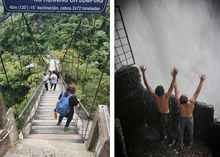
Each day brought opportunities for everyone to step out of our comfort zones whether it be Paloma cautiously walking across a suspended bridge or a select few trekking through 200-meter dark, damp underground pre-Hispanic tunnel. Or maybe it was simply in the joyous and thoughtful moments that come with travel abroad when two shared explosive laughter over a local drink which they accompanied by a silly dance, or when a few soaked in the path of huge waterfall or eventually when the entire group danced in their seats in the back of an open air “chiva” bus through vibrant reggaeton rhythms and bright disco lights in broad daylight.
For me, it was the thrill of being propelled across a ravine for the very first time on a zipline accompanied by Mario, our amazing ever-present tour guide who graciously accepted my last-minute pleas for a tandem partner and, without whom, I might never have taken the plunge. This act would be the physical representation of the elation I felt after joining the class on that very that first Valentine’s day. Like the Hi-Chews that had become a quiet symbol of our shared experience, I found a reflection of the sweetness we shared, and the vibrant spirit of SPA204 that continues to linger long after the shutter clicked.
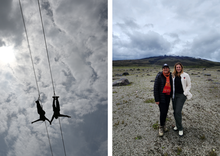
I would like to extend my heartfelt gratitude to our department Chair, Pedro Meira Monteiro and our Financial Manager, Karen Gonzalez for allowing me the opportunity to take on this important role with the group. To our tour guide, Mario, who was always a step ahead and went above and beyond his duties with caring gestures and tasty snacks presented just at the right time. And to Paloma Mascardo for having faith in my ability to support her during preparation, throughout the journey to Ecuador and ultimately on ground. Her gracious and compassionate nature has been an inspiration throughout the process, and I couldn’t be more appreciative of our newfound friendship.
Finally, although the shipment of prescription glasses meant for donation arrived too late for our trip to the Andes, it didn’t go to waste. Thanks to our collective efforts, and some serendipitous timing, we now have enough glasses for students to finally read the syllabus clearly and realize, perhaps a bit too late, that attendance is actually mandatory.
